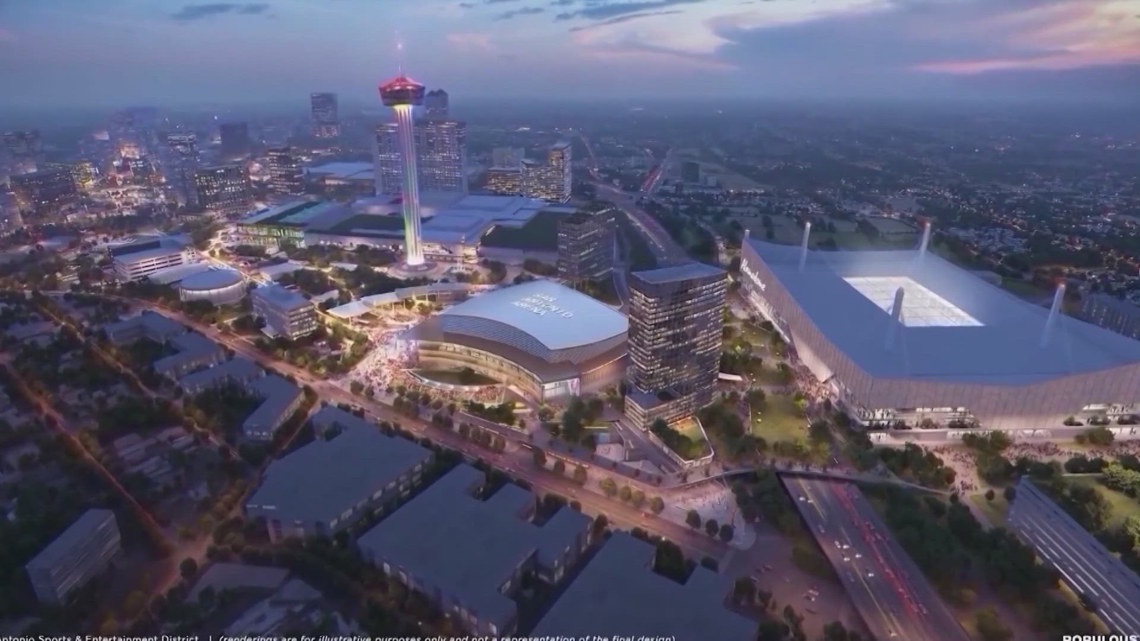Spurs Sports and Entertainment pledged $500 million alone to a new downtown arena as talks with the city and Bexar County continue.
SAN ANTONIO — The Spurs are pledging $1 billion in investment into Project Marvel, the plan to build a downtown sports and entertainment district to boost economic vibrancy in central San Antonio.
In a letter to the city, Peter J. Holt, chairman of Spurs Sports & Entertainment, outlined details of the commitment to provide funding for the ambitious project, including $500 million for a new downtown arena and cost overruns.
“This vision includes creating new, well-paying jobs for local workers, generating additional revenue to fund local schools, roads, and public safety, and improving our ability to compete with other major cities for investment,” Holt wrote in Thursday’s letter to City Manager Erik Walsh, Mayor Gina Ortiz Jones and City Council members.
In addition to half a billion dollars for a new arena — expected to cost anywhere from $1.2 billion to $1.5 billion — Holt wrote the franchise was also pleding $500 million for new downtown development and $60 in community incentives.
Those incentives including ensuring 30% of arena construction contracts are awarded to local companies; covering VIA Park & Ride service on Spurs game days for 2,000 fans; ensuring 500 tickets for every Spurs home game are available for $25 or less; and the proposal of “a new policy that will target early childhood education and child care challenges in the community.”
“We recognize there is still more work to do and we welcome it,” Holt wrote.


The commitment brings new clarity to just how much the team is willing to spend to move downtown, a question that’s been percolating ever since the city’s Project Marvel dream was publicly revealed for the first time last fall. The Spurs arena is just one anchor project of that dream, the others including a proposed expansion of the Henry B. González Convention Center; a major Alamodome renovation; the transformation of the old federal courthouse into live music venue; and the construction of a land bridge over Interstate 37.
The City Council in May unanimously approved establishing a new Project Finance Zone (PFZ) which would provide revenues to fund the arena. A new Spurs arena, one of the anchor projects for Project Marvel, is expected to cost anywhere between $1.2 billion and $1.5 billion. That’s in line with newer NBA venues.
The City of San Antonio has said the PFZ would pay for itself over time. The city estimates it would bring in $2.5 billion over the next 20 years.
Lingering concerns
But even with the city’s potential funding framework and the massive commitment touted by Holt, dozens of people who spoke during Friday’s City Council meeting still weren’t sold on the multibillion-dollar venture.
Many residents urged council to reconsider a bond election in November that would aim to supplement more than $250 million toward Project Marvel, stressing a lack of confidence in the financial model presented thus far by city officials.
“Will we hear about the uncertainty of whether the Spurs will reject this deal if the city bonds fail? Is there really no other way?” wondered Stephen Versteeg, the first community member to speak during the public comment portion of the meeting.
“I’m a fan of the San Antonio Spurs, but I’m not a fan of this plan,” said Richard Aguilar, a local pastor. “It doesn’t make sense to me spiritually, morally and economically.”
Walsh delivered a presentation outlining the preliminary framework to fund Project Marvel.
Anywhere from $350 million to $500 million would be utilized by the city for the arena while Bexar County would contribute 25% of the arena project cost through funds generated by a venue tax, according to the presented financing structure.
“It’s imperative that you and the public and this community, before we move ahead much further, get a firm substantive cost estimate with some firm guarantees,” said resident Haywood Sanders.
Others like Kayla Miranda questioned the city’s priorities in terms of inequities and quality of life.
“If you can find millions or billions of dollars to fund an entertainment center, than why can’t you find the funding to provide truly affordable housing?” Miranda said.
